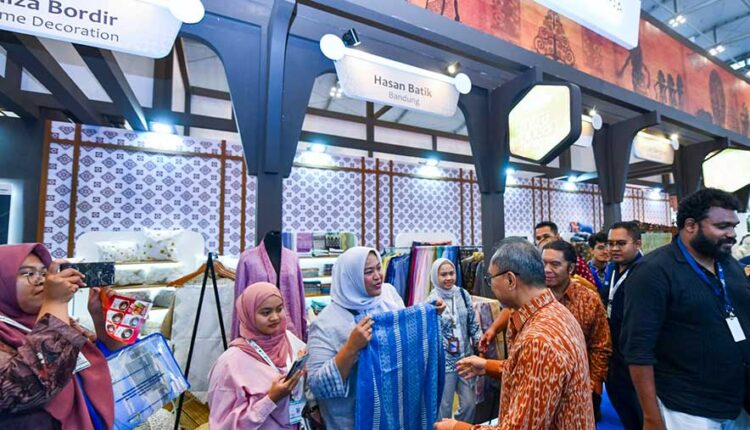Indonesia Strengthens International Cooperation to Increase MSME Exports
By: Arsyinta Mentari ) * Indonesia continues to strengthen its efforts to increase exports of Micro, Small, and Medium Enterprises (MSMEs) products, in line with government policies to increase national competitiveness in the global market. One of the concrete steps taken is to establish international cooperation with various countries. One of them, in a bilateral meeting between Indonesian Trade Minister Budi Santoso and Singapore’s Minister for Sustainability and Environment Grace Fu, Indonesia emphasized the importance of strengthening exports of MSME products. In the discussion, Indonesia prioritized the issue of developing MSMEs for export, with Singapore responding positively and inviting Indonesia to explore more opportunities for digital cooperation and trade facilitation.Budi Santoso explained that one of the priority programs that the government is focusing on is UMKM BISA (Dare to Innovate, Ready to Adapt) Export. This program aims to encourage Indonesian UMKM to be able to penetrate the international market, by strengthening their capacity in terms of innovation and adaptation to global market demands. Singapore as a strategic partner of Indonesia, provides an opportunity to explore more deeply the potential of Indonesian MSMEs, especially in the field of digital cooperation and trade. Through this program, Indonesia hopes that MSMEs can increase their competitiveness by utilizing digital technology and creating more innovative products that are in accordance with the needs of the global market. This cooperation is in line with Indonesia’s efforts to utilize international forums to promote trade and expand market access. During the meeting, the two countries also discussed the holding of the Annual Ministerial Dialogue (AMD) Forum, a ministerial-level dialogue forum that serves as a means to discuss various trade issues, including trade in goods and services, e-commerce, and the halal industry. This International Forum is expected to strengthen trade relations between the two countries and help open more export opportunities for Indonesian MSMEs. AMD is also a strategic step to improve coordination between the governments of the two countries in solving challenges faced in international trade, as well as providing opportunities for MSMEs to introduce their products in foreign markets.In addition, Indonesia also continues to invite partner countries, such as Singapore, to invest more in Indonesia, especially in strategic areas. This shows that the Indonesian government is committed to creating a conducive investment climate for MSMEs so that they can grow and develop through collaboration with the global private sector.Investments from these partner countries are expected to encourage the MSME sector to expand their production capacity and introduce their products to the international market. Thus, the success of MSMEs in penetrating the global market depends not only on existing policies, but also on the availability of investments that can increase production and distribution capacity.However, even though Indonesia’s MSME sector has great potential, its contribution to total national exports is still relatively low. Based on data from the Ministry of Cooperatives and SMEs, the contribution of MSMEs to national exports in 2023 will only reach 15.7 percent, far below countries such as Singapore which reached 41 percent and Thailand which was at 29 percent. In this regard, the Indonesian government through the Coordinating Minister for Economic Affairs, Airlangga Hartarto, emphasized that efforts to accelerate MSME exports are important. Airlangga revealed that the government continues to strive to increase the contribution of MSMEs to exports by forming a National Export Enhancement Task Force which aims to support MSMEs to access global markets more easily. This task force will provide training, mentoring, and access to international networks that will make it easier for MSMEs to develop products.Meanwhile, one example of the success of MSMEs in penetrating the international market is the first export of chili sauce products made by Indonesian MSMEs. Through collaboration between Customs, the Ministry of Trade, and MSME actors, chili sauce products from “Dapurnya Subur” were successfully exported to several Asian countries such as Singapore, Hong Kong, and Taiwan. Head of the Malang Customs Information and Extension Service Section, Dwi PrasetyoRini, explained that this first export is proof that Indonesian MSMEs have great potential to enter the international market. Dwi also emphasized the importance of cooperation between ministries and institutions in supporting MSMEs so that they can penetrate the overseas market. The government continues to strengthen policies that support MSME exports, especially through counseling and training programs to prepare MSME players to be better prepared to compete in the global market. In addition, by utilizing digital technology, Indonesian MSMEs are expected to be able to more easily reach international markets without being limited by distance or time. The international collaboration between Indonesia and Singapore in developing MSMEs is a strategic step in supporting the export of local products to the global market. With the support of clear policies and close cooperation between the government, MSME actors, and the private sector, Indonesia is expected to increase the contribution of MSME exports and strengthen the national economy in the international arena. Going forward, the biggest challenge is to ensure that Indonesian MSMEs continue to grow, innovate, and adapt to increasingly competitive market developments. In order for MSMEs to compete in the global market, MSME players need to continue to innovate in products and business processes and take advantage of existing international cooperation opportunities.)*
The author is a contributor to Jeka Media